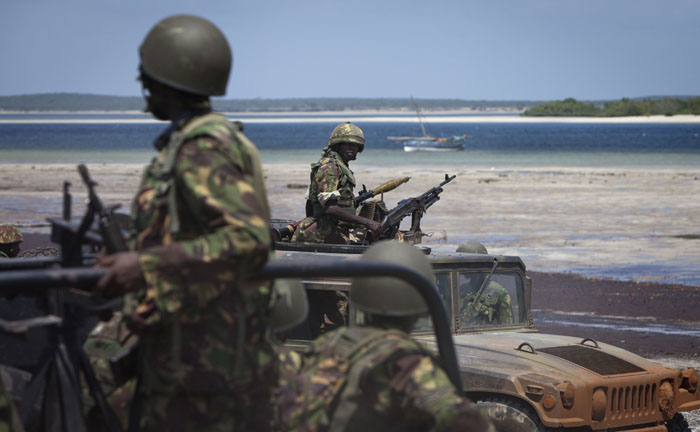
This post originally appeared on Think Progress.
NAIROBI, Kenya — Kenya’s landmark incursion into Somalia last October and ongoing military operations present some important opportunities and disquieting potential pitfalls for establishing lasting security in a region controlled by the al Qaeda-linked jihadi group al-Shabaab.
The nearly three-month long intervention is the Kenyan army’s first-ever offensive across its borders. The commotion after Kenyan soldiers crossed over into Somalia and, reportedly, then sought approval from the Somalia’s transitional federal government compounded questions about the army’s experience. It also accentuated concerns about upsetting the fragile arrangements that have enabled Kenya to, for the most part, avoid being a target of Shabaab’s deadly attacks.
But beyond the viability of the military campaign to rout a brutal militant group that has employed devastating insurgency tactics against peacekeepers and soldiers more familiar with the terrain, the question of what comes next looms even larger.
“Intervention strategies that plan the war but not the peace will fail,” Somalia expert Ken Menkhaus warned in a policy paper published last Friday by the Enough Project.
“Indifference to or wishful thinking about the crafting of a post-intervention political order guarantees disorder, and can leave both the occupied country and the intervening power worse off than before.”
The stakes of the military operation against Shabaab this time around cannot be overstated. If the current campaign fails to dramatically undercut—if not wholly defeat—Shabaab, the situation will be even worse, as a longtime Somalia watcher here remarked to Enough recently: “Shabaab will look invincible.”
The responsibility for coming up with the post-intervention plan lies squarely with Somali leaders and authorities but will require strong diplomatic efforts and coordination by international partners, wrote Menkhaus, a professor at Davidson College. In particular, non-Somali actors must press for a governing plan that does not see the potential prizes of the operation against Shabaab—most significantly, the lucrative and hotly contested port city of Kismayo—divvied up along clan lines. Menkhaus explained:
The Kenyan government cannot facilitate this kind of Somali dialogue alone—this requires broader diplomatic engagement by key donor governments from the West, the Islamic world, the United Nations, the African Union, and regional external actors. The details of a governing arrangement need to be hammered out by Somalis, not foreigners, but the general principle of open access is something external actors can and should insist on.
Kenyan officials have expressed a variety of goals for their intervention, but they boil down to the core desire for a friendlier Somali-Kenya border area—a plan long in the works, according to U.S. cables published by Wikileaks about the Kenyan government’s training of soldiers for the operation. To increase the likelihood of success, Menkhaus advises pursuing three key objectives:
- creating a buffer zone of peaceful, cooperative communities along the border to temper the militant al-Shabaab factions in their midst;
- advocating for a Jubbaland regional state that would at first exclusively serve the important role of ensuring that local communities are represented in national institutions (in contrast to the administrative role of the Puntland and Somaliland governments); and
- brokering an inclusive deal and “cosmopolitan strategy” for the governing of Kismayo, including establishing an international customs authority at the port to generate revenue for public works projects, support a lean civil service, and set an example for good management of public funds.
“Though there are good reasons to second-guess the Kenyan military intervention, it could produce an unexpected and rare window of opportunity in Kismayo,” Menkhaus wrote. “That opportunity will be missed unless diplomatic initiatives get underway immediately.”
Likewise, failure to plan for post-intervention governance in southern Somalia risks undoing any security gains the various allied forces can produce, rendering the new terrorism risks assumed by tourist-friendly Kenya pointless.
Photo: Kenyan army soldiers sit in their armored vehicles next to the white sand shore of the seaside town of Bur Garbo, Somalia (AP)

